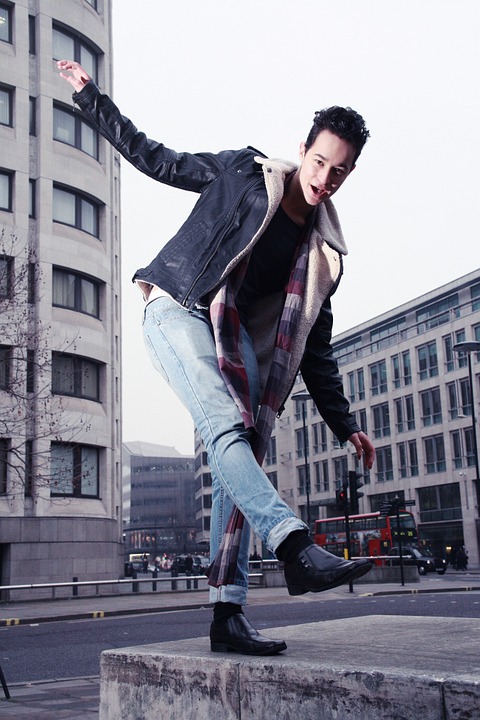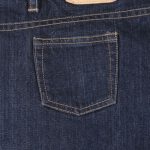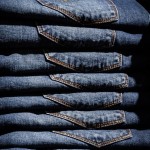Have your jeans faded to a lighter color? It’s frustrating when you buy a pair of dark indigo jeans, only to discover that they’ve faded to a light blue color just a few weeks later. While you can still worn faded jeans, they won’t offer the same aesthetic value. Therefore, you should follow some basic steps to protect your jeans from fading. The first step to preventing this from happening to your jeans is to understand why jeans fade. Although there are many causes of fading, below are the nine most common reasons why jeans fade.
#1) Raw Denim
Jeans made of raw denim are more likely to fade than jeans made of washed denim. This is because raw denim hasn’t been washed during the production process. It’s called “raw” denim because the denim is untouched and unwashed. While some people prefer the dark color of raw denim jeans, these jeans are more likely to fade than washed or dry denim jeans. If you’re worried about your jeans fading, choose jeans made of washed or dry denim. Unlike their raw counterpart, these jeans have been washed during the production process, so less dye will leach from the fabric when you wash them.
#2) Hot Water
Washing your jeans in hot water will increase the risk of fading. Exposure to hot water causes the dye to release from the denim fabric. Your jeans won’t necessarily turn white after washing them in hot water. Rather, they’ll fade to a lighter tone if you continue to wash them in hot water. To prevent this from happening to your jeans, wash them in cold water. Contrary to what some people believe, washing clothes in cold water is just as effective at removing stains than washing clothes in hot water. The only difference is that cold water doesn’t contribute to fading.
#3) Bleach
Millions of people add bleach to their washing machine loads to help clean and remove stains. Although effective for this purpose, bleach will take a toll on your garments’ color, including your jeans. Even a small amount of bleach may turn your jeans to a lighter color. If you’re struggling with stains on your jeans, spot clean the area with a fabric stain remover. If that doesn’t work, try spraying it with a solution of vinegar and water. These methods are both just as effective as bleach, but they won’t cause your jeans to fade.
#4) Wash With White Clothes
Why shouldn’t you wash your jeans with white clothes? Unless your jeans are white, washing them with white clothes will cause them to fade. Even white clothes are produced with dye (it’s white, of course). And each time that you wash your jeans with white clothes, some of the white dye will be released, thereby causing your jeans to gradually fade. This won’t happen overnight. It often takes months or even years before a pair of jeans will fade. However, you can slow down this process and preserve the original color of your jeans by washing them with other dark-colored garments.
#5) Sun Exposure
With its ultraviolet light, the sun is a powerful force of nature that can cause clothes, including jeans, to fade. If you wear a pair of indigo-colored jeans outside day after day, they will probably fade. Unfortunately, this isn’t something that you can easily prevent. The only way to fully stop sunlight from making your jeans fade is to avoid wearing them outdoors. You can slow down the process, however, by choosing jeans made of high-quality denim. High-quality denim is designed with superior dye that’s less likely to leach than low-quality jeans.
#6) Cheap Detergent
Don’t underestimate the importance of washing your jeans with a name brand, high-quality laundry detergent. Cheap detergents not only offer poor cleaning power, but they also increase the risk of fading. When you remove your jeans from the washing machine, you may discover them in a lighter color. Therefore, you should spend the extra money on a premium laundry detergent with which to wash your jeans.
#7) Ironing
There’s nothing wrong with ironing your jeans to press out the wrinkles and creases, but you shouldn’t overdo it. Ironing your jeans each time you wear them will stress and damage the fabric. You may not see any immediate damage. Eventually, though, the outer layer of the denim fabric may become singed, resulting in a lighter, faded color. If you’re going to iron your jeans, use the low heat setting. Also, only iron your jeans when they are wrinkled. If your jeans aren’t wrinkled, there’s no point in ironing them, as this only increases the risk of fading.
#8) Dirt
Not surprisingly, dirty jeans are more likely to fade than clean jeans of the same type. When jeans are exposed to dirt, the sediment will rub against the denim fabric, causing the dye compounds to release and, subsequently, the jeans to fade. The good news is that you can prevent this from happening by washing and cleaning your jeans on a regular basis. You don’t have to necessarily wash them every time you wear them. Rather, wash your jeans when they are visibly dirty. Giving your jeans a little TLC will protect them from fading as well as other forms of damage.
#9) Low-Quality Denim
Perhaps the most common reason why jeans fade is because they are made of low-quality denim. Not all denim is made equal. Some companies use cheap material and craftsmanship to make their jeans. The end result is an inferior product that’s more likely to fade. If you’re going to buy a new pair of jeans, invest in a pair made of high-quality, premium denim. You can expect to pay more for high-quality jeans, but they’ll last longer and offer a higher level of comfort and versatility than low-quality jeans. And because they are made of premium denim, you don’t have to worry about them fading anytime soon.












